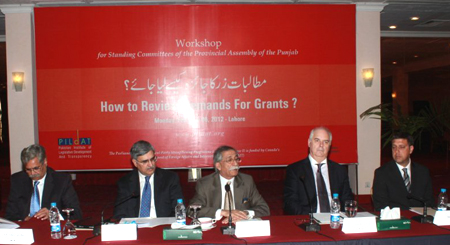|
|
| |
| EVENTS |
|
|
> Committees Role a must in Budget Process, demand Punjab MPAs
?- Punjab Assembly Standing Committees discuss how to effectively review budget demands for grants
- Block allocations, dormant committees and supplementary budget run counter to democratic norm
|
| |
|
Workshop
February 06, 2012
Lahore
|
|
| |
In a workshop held to orient chairs and members of the Standing Committees of the Provincial Assembly of the Punjab, Speaker Punjab Assembly and members said that Committees should be given a role in reviewing Provincial Budget in Punjab. MPAs from all parties criticised the increasing trend of block allocations and said that these, together with supplementary budget and dormant committees run counter to democratic norms. |
|
| |
Three experts shared their recommendations on how can the committees effectively review departmental budgets for effective public scrutiny. These included Mr. Nohman Ishtiaq, Public Financial Management Specialist; Advisor to the Federal Government of Pakistan, Mr. Jean Paul Ruszkowski, President and CEO, Parliamentary Centre, Canada and Mr. Trevor Day, Deputy Clerk of Committees, Ontario Legislature, Canada.
|
|
| |
In his opening remarks, Rana Muhammad Iqbal Khan, MPA, Speaker, Provincial Assembly of the Punjab, praised the initiatives of PILDAT and said that based on PILDAT recommendations, the Punjab Assembly took the lead over other provincial legislatures of Pakistan when on October 13, 2010, the Assembly formally passed an amendment in the rules through which it fixed fixing at least four days for pre-budget debate in its sessions being held from January to March every year. |
|
| |
Explaining how the Committees effectively scrutinise budget, Mr. Nohman Ishtiaq said that 4 principles need to be kept in view which include Economy, Efficiency, Effectiveness, and Equity. He said that Demands for Grants, together with the White Paper on the budget and Medium-Term Budgetary Framework that links government�s policy plans with budgets and performance, can help legislators and committees in oversight of the budget. He also provided examples of some of the key questions Standing Committees on Health and Education can ask while reviewing budget. Advising MPAs to guard against block allocations in the budget, Nohman Ishtiaq said that the phenomenon of block allocations is on the rise; for instance out of a total of Rs.14.8 billion of PSDP allocation for Health, Rs.5.7 billion (39% of total budget) relate to block allocations. He said that block allocations relate primarily to unapproved projects and represent bad budgeting that may be open to misuse. |
|
| |
Sharing examples from Provincial Assembly of Ontario, Canada, on effective ways Committees can engage in budget scrutiny, Mr. Trevor Day said that some of the best practices include that Committees remain informed and demand briefing material from respective departments. Committees should engage in year to year comparisons in order to spot variance and ask questions about estimate sources. He advised that only informed committee members who read the provided material can highlighting questions that are needed to be asked. Outside experts� help can also be sought through public hearings and experts� testimonies. It is useful that committees determine a line of questioning choosing from current events, constituency issues and party policies to decide what questions to ask. He also said that while committees have a right to oversee budget, asking questions respectfully will result in better answers and greater cooperation. |
|
| |
Mr. Jean Paul Ruszkowski said that reviewing budget estimates can improve the quality of information provided to parliamentarians and the public. Committees in Canada examine the reports on Plans and Priorities (RPPs) and the Departmental Performance Reports (DPRs), call ministers & officials as witnesses, approve, reduce, or not accept the estimates referred to them and examine the report on the corresponding mandate, management and operation of the departments assigned to them. In Canada both the House of Commons and Ontario Legislature Finance Committees hold pre-budget consultation process across the country. In recent years the number of oral and written submissions to the Committee has been growing showing an increasing interest by individual citizens and citizens groups to have their voice heard. |
|
| |
Initiating the Workshop, Mr. Ahmed Bilal Mehboob said that there is an obligation on elected representatives of the people in an assembly to ensure that all revenue and spending measures they authorize, legally and constitutionally, are fiscally sound, match the needs and aspirations of the population with equity, and that they are being implemented appropriately and efficiently. PILDAT believes that Rules of Procedure and the Conduct of Business in the Provincial Assembly of the Punjab should be amended to provide a role for the Standing Committees to review ministerial demands for grants once the budget is presented and prepare reports by a specified period and table those reports in the House. The debate on budget should resume in the light of reports by Committees. Today�s workshop, he added, is organized to aid and assist Committees and their members to effectively review departmentally-related budgets and demands for grants. |
|
| |
The Workshop was organised by PILDAT under the project Parliamentary and Political Party Strengthening-II which is funded through Canada�s Department of Foreign Affairs and International Trade � DFAIT. The project is implemented jointly by the Parliamentary Centre, Canada and PILDAT. |
|
| |
|
|
| |
|
|
| |

|
|
| |
|
|
| |

|
|
|
|
|
|
|
|
|